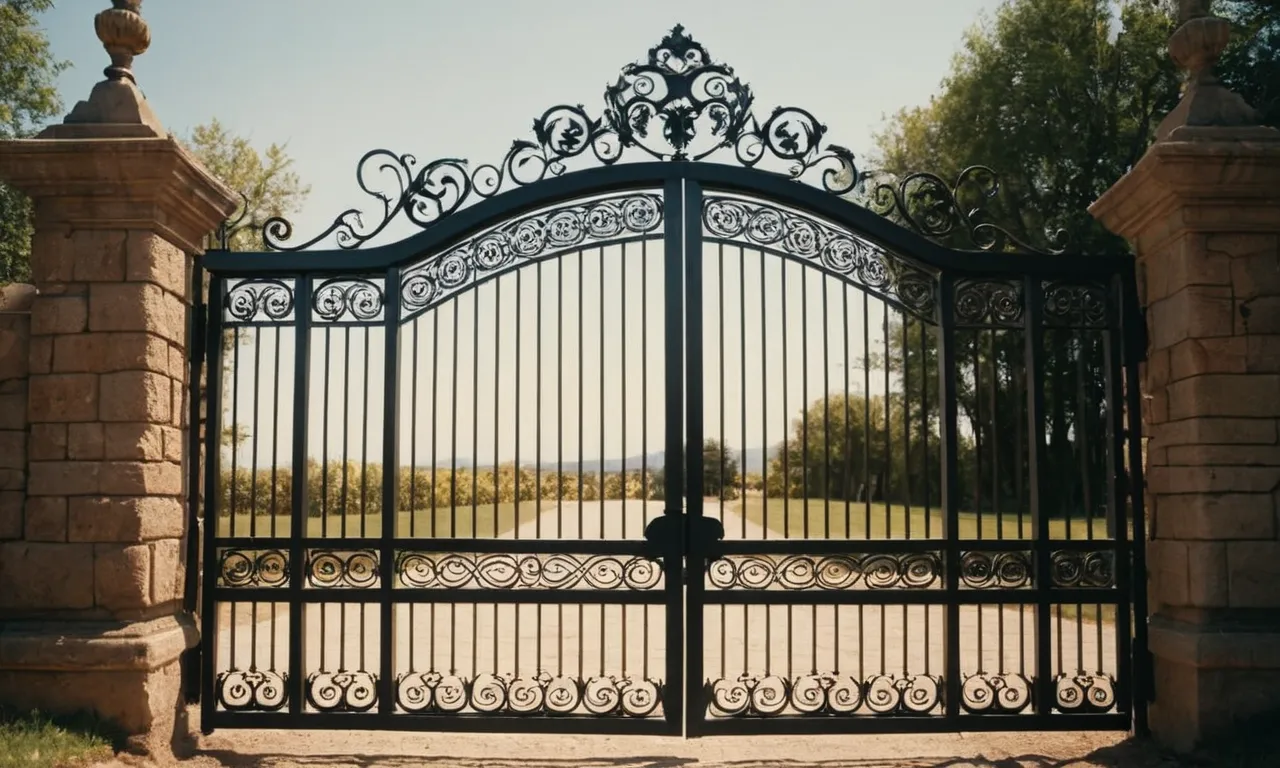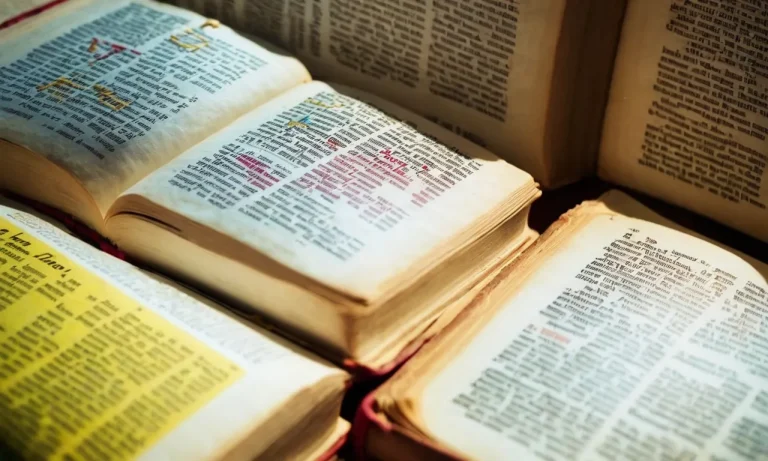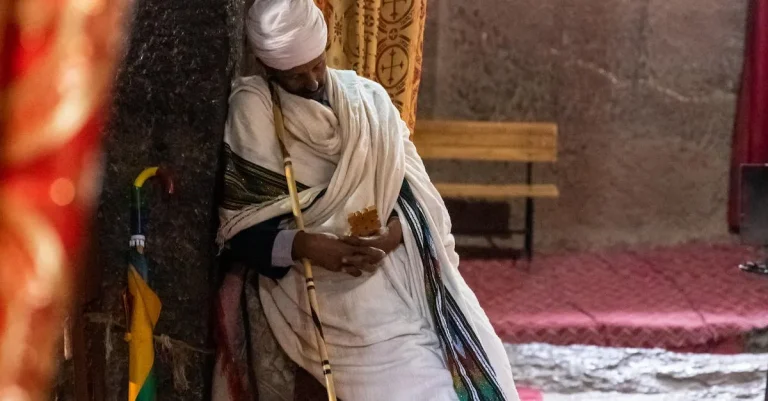What Is A Gatekeeper In The Bible?
If you are wondering what a gatekeeper is in the context of the Bible, you have come to the right place. In short, a gatekeeper was someone who was tasked with guarding the entrances and exits to important places in biblical times.
This article will provide a comprehensive explanation of what gatekeepers did, their significance, examples of famous gatekeepers in the Bible, their duties and responsibilities, the skills required, and the spiritual meaning behind these important protectors.
Definition and Role of a Gatekeeper
Literal Function as a Protector
In ancient times, a gatekeeper was literally the person who guarded the gates of a city or palace. This was an important role, as the gatekeeper determined who could enter and leave the premises. Gatekeepers were entrusted with keeping out enemies, thieves and other unwanted people.
They needed to be strong and vigilant to fend off intruders. Gatekeepers would question strangers before allowing them to pass through the gates. They kept watch over the gates day and night, only opening them at appointed times. The safety of those inside depended on the gatekeeper’s diligence.
Some well-known gatekeepers in the Bible include:
- Porters of the temple who guarded the gates of God’s house (1 Chronicles 9:17-27).
- Gatekeepers of the camp of the Levites who protected the tabernacle (1 Chronicles 9:23).
- Shallum the gatekeeper who helped repair the walls of Jerusalem (Nehemiah 3:13-15).
These examples illustrate how in ancient biblical cities, gatekeepers played the crucial role of securing the perimeters and monitoring who could enter. Their literal job protected people from harm.
Metaphorical Significance
Beyond the literal sense, gatekeepers took on symbolic meaning in the Bible. God was seen as the ultimate gatekeeper who decides who may enter His holy realm. Jesus called Himself the gateway to salvation, stating “I am the gate; whoever enters through me will be saved” (John 10:9).
Those who trust in Christ have access to God’s kingdom.
Additionally, Christian leaders may be considered gatekeepers who guard doctrinal truth and only allow sound teaching to influence the church. Pastors often serve as spiritual gatekeepers, watching over their flocks and keeping harmful ideas or behaviors from impacting believers.
They shepherd Christ’s sheep, protecting them from devouring wolves.
Parents can also act as gatekeepers, filtering content and influences to create a safe environment for their children. They restrict access to inappropriate media, relationships or substances that could lead their family astray.
In the Bible, gatekeepers went from having a literal duty over physical gates to taking on important metaphorical significance. Whether securing a city or God’s truth, they prevent that which could bring harm from getting through.
Gatekeepers take their job seriously, understanding the huge responsibility it entails.
Famous Examples of Gatekeepers
Porters of the Temple
The porters, or gatekeepers, of the Temple in Jerusalem were a group of Levites who had the important responsibility of guarding the entrances to the Temple. They are mentioned numerous times in the Old Testament, especially in 1 Chronicles.
According to 1 Chronicles 9:17-27, the porters were organized into groups that guarded different gates of the Temple. They lived in rooms near the gates so that they could be available at all hours to control who entered.
Four main families are named as being the chief gatekeeper families: Meshelemiah, Obed-Edom, Hosah, and Merari.
The duties of the gatekeepers included protecting the holy spaces from unclean people and guarding the treasuries and storerooms. They had to ensure that no unauthorized people entered the sacred spaces.
They were also in charge of the Temple’s treasuries and responsible for receiving offerings and tithes from the people. Their role was hugely important in maintaining the sanctity and purity of the Temple.
Some of the most famous porters named in the Bible include:
- Kore son of Imnah, keeper of the East Gate (1 Chronicles 9:19)
- Shallum son of Kore, keeper of the East Gate in King Hezekiah’s time (2 Kings 7:10)
- Meshezabel son of Obed-Edom, keeper of the South Gate (1 Chronicles 26:1-4)
- Obed-Edom himself, who took care of the Ark of the Covenant for a period (1 Chronicles 15:18)
The gatekeepers were respected for their holy duties and praised for their faithfulness. Their role ensured proper reverence for God’s house.
Gatekeepers in the Book of Chronicles
The Books of Chronicles mention the Temple gatekeepers frequently as part of the administrative system David organized for the Temple. David appointed certain Levitical families as “keepers of the gates of the tabernacle” (1 Chronicles 9:17-27).
The gatekeepers are described as being responsible for the rooms and treasuries near the gates.
When Solomon built the First Temple to replace the portable tabernacle, the gatekeeper system continued. 1 Chronicles 26 lists the divisions of gatekeepers at that time:
- Meshelemiah son of Kore had charge of the North Gate
- Zechariah son of Meshelemiah had charge of the North Gate in David’s time
- Obed-Edom had charge of the South Gate
- Hosah had charge of the West Gate
- Shuppim and Hosah had charge of the East Gate
These gatekeepers guarded the storehouses and treasures and kept charge over the holy things, just as in the tabernacle (1 Chron. 26:20). Other Books of Chronicles passages mention:
- The contributions for rebuilding the Temple being given to the gatekeepers (2 Chron. 24:8-11)
- Gatekeepers being among those Josiah ordered to cleanse the Temple (2 Chron. 29:16)
- Hezekiah organizing the priests and Levites including gatekeepers for Temple service (2 Chron. 31:2)
The Chronicler emphasizes the gatekeepers as part of the Temple staffing system. They had an important function in God’s house by ensuring holiness and purity in the Temple.
Responsibilities and Duties
Guarding the Gates
In ancient times, gatekeepers played a vital role in protecting cities and settlements. Stationed at the gates, they were responsible for controlling who entered and left the city walls. This was an important security function, as gatekeepers would guard against spies, enemies, and other unwanted individuals from gaining access.
Some of the key duties of gatekeepers were:
- Maintaining a roster of approved visitors and traders – Gatekeepers kept track of who had permission to enter the city. This list helped them screen individuals and caravans at the gates.
- Inspecting merchandise and collecting tolls/taxes – They checked all trade items and caravans entering or leaving the city, levying fees and tariffs as required.
- Operating the gates and guarding the doors – This involved physically opening and closing the heavy gates of the city walls at appropriate times and securing the doors against intruders.
- Defending the gates against attack – Gatekeepers guarded the gates, sometimes alongside other armed guards, to fend off any enemy assaults on the gates.
As protectors of the threshold, gatekeepers needed to be vigilant, have knowledge of people authorized to enter, and be ready to defend the gates at all times. This important role enabled cities to control their borders and residents to live in greater safety and security.
Registrar and Treasurer Functions
In addition to defense duties, biblical gatekeepers often functioned as record keepers and treasurers managing administrative affairs of their cities. Some of these civic duties included:
- Record keeping – They maintained records of people, genealogies, goods, and events in their jurisdiction. This registrar function created useful census data.
- Collection of payments – They gathered taxes, tolls, and tithes from residents and visitors and issued receipts.
- Safekeeping of valuables – Temple treasuries and municipal coffers were located near gates for security. Gatekeepers safeguarded these assets.
- Judicial matters – They arbitrated disputes that arose within their gates and executed policies together with city elders.
Carrying out these important clerical tasks required gatekeepers to be literate, numerate, and have excellent organizational abilities. By centralizing many administrative functions at the gates, gatekeepers saved officials and citizens time while enabling smooth financial dealings and record keeping.
This increased efficiency benefited entire communities.
Skills and Attributes Needed
Being a gatekeeper in the Bible requires certain skills and attributes to fulfill the role effectively. Here are some of the key qualities needed:
Discernment
Discernment is crucial for determining what ideas, people, and influences to allow through the “gate.” Gatekeepers must have sharp spiritual insight to distinguish between truthful and false teachings (1 John 4:1). They need wisdom from God to know good from evil (Hebrews 5:14).
Courage
It takes courage to confront difficult issues and stand up for what’s right. Gatekeepers have to be willing to speak the truth even when it’s unpopular and defend the gate against harmful intruders (Acts 20:28-31). This requires spiritual boldness and fortitude.
Humility
Despite their important role, gatekeepers must stay humble, remembering that God is the ultimate Guardian and they are stewards of His gate. They should keep “the gate open wide to give access to the glory of God’s kingdom” (Matthew 25:31-46).
Gatekeepers operate in service, not out of pride or selfish ambition.
Care and Diligence
Gatekeepers are entrusted with great responsibility for protecting and tending God’s “gate.” They must be faithful and dependable – keeping careful, prayerful watch, yet opening the gate when appropriate (Mark 13:34).
It requires patient care, steadfast diligence and devotion to duty with dependence on God.
Teachability
Since gatekeepers are guarding God’s property, they must follow His guidelines rather than imposing their own. They should be open to instruction from God’s Word and correction from godly believers if needed (2 Timothy 3:16-17).
Gatekeepers protect the gate but are ultimately under the authority of the Lord who owns it.
Spiritual Symbolism
The concept of a gatekeeper has rich spiritual symbolism in the Bible. Gatekeepers were appointed by God to protect the gates of the temple and allow only the spiritually clean to enter. They served as spiritual guardians, keeping watch over the holy thresholds.
On a symbolic level, gatekeepers represent discernment and the ability to separate truth from lies. They are vigilant protectors from spiritual deception and guard the path to greater wisdom and enlightenment. As it says in John 10:7, “I am the gate for the sheep.”
Jesus as the gateway to salvation and eternal life.
The role of a gatekeeper also symbolizes the narrow path to holiness. As Matthew 7:13-14 states, “Enter through the narrow gate. For wide is the gate and broad is the road that leads to destruction, and many enter through it.
But small is the gate and narrow the road that leads to life, and only a few find it.” The gatekeeper keeps us on the straight and narrow path.
Additionally, a gatekeeper filters out distractions and harmful influences, helping us stay focused on God. They are spiritual guides who point us to Christ, the one true gateway to the Father. As John 14:6 declares, “I am the way and the truth and the life.
No one comes to the Father except through me.”
Ultimately, Jesus Christ is the only Gatekeeper who can grant us access to eternal salvation. By believing in Him, we pass through the narrow gate and enter into the Kingdom of Heaven.
Conclusion
In conclusion, gatekeepers played a vital role in the Bible by protecting important spiritual places. They guarded the thresholds between the outside world and the sacred inner precincts, keeping sanctuaries holy.
Their position also carried great significance as guardians of God’s house and stewards of offerings brought to the temple.
Beyond the literal duties, gatekeepers also symbolize discernment between good and evil, warding off harm and letting in righteousness. Their mission required courage, honesty, wisdom and spiritual commitment.
The gatekeepers in the Bible inspire modern readers to also watch over what they allow to influence their hearts and minds.








